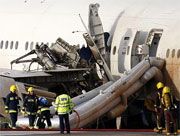 Rolls-Royce Trent 800-series engines can suffer from ice-induced fuel constriction in flight, and in the opinion of the NTSB, current precautions are “insufficient” to prevent the possibility of a fatal crash — and they’ll be flying like that for at least six more months. So why not just add an anti-icing additive to the fuel? That solution, along others is being considered after both the NTSB and the AAIB released reports last week. Unfortunately, all solutions will come with cost. In the case of anti-icing additives, one drawback is the need for more frequent maintenance, but an additive may still be a part of the short term solution. Any fuel system modifications (currently in the works at Rolls-Royce) will require extensive testing and certification that may take more than 12 months. The NTSB is recommending a fix be available in six. In the meanwhile, the problem that’s already caused un-commanded rollbacks on two separate passenger flights still exists. The current fleet of about 736 Boeing 777s includes about 220 powered by the Rolls-Royce Trent engine/fuel system in question.
Rolls-Royce Trent 800-series engines can suffer from ice-induced fuel constriction in flight, and in the opinion of the NTSB, current precautions are “insufficient” to prevent the possibility of a fatal crash — and they’ll be flying like that for at least six more months. So why not just add an anti-icing additive to the fuel? That solution, along others is being considered after both the NTSB and the AAIB released reports last week. Unfortunately, all solutions will come with cost. In the case of anti-icing additives, one drawback is the need for more frequent maintenance, but an additive may still be a part of the short term solution. Any fuel system modifications (currently in the works at Rolls-Royce) will require extensive testing and certification that may take more than 12 months. The NTSB is recommending a fix be available in six. In the meanwhile, the problem that’s already caused un-commanded rollbacks on two separate passenger flights still exists. The current fleet of about 736 Boeing 777s includes about 220 powered by the Rolls-Royce Trent engine/fuel system in question.
Investigators studying the British Airways 777 that in January crashed short of Heathrow (with no fatalities) and a Delta Airlines 777 that last November temporarily lost power at altitude believe the jets’ fuel system can compromise fuel flow at the fuel/oil heat exchangers due to ice accretion that ultimately stifles the engines’ thrust. Boeing 777’s carry about 50 feet of unheated pipes as part of their fuel system. Investigators have shown in tests that ice can accumulate in the fuel system which includes about 50 feet of unheated pipes.


































